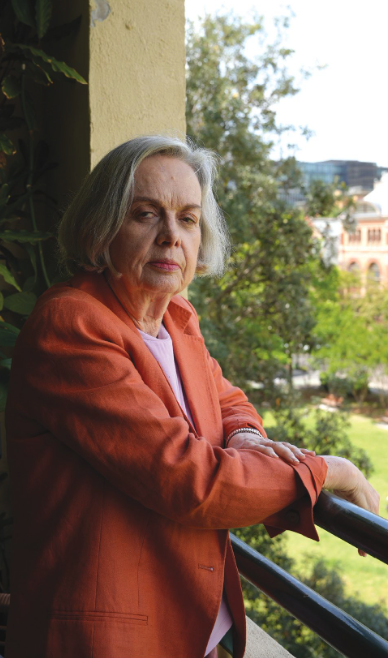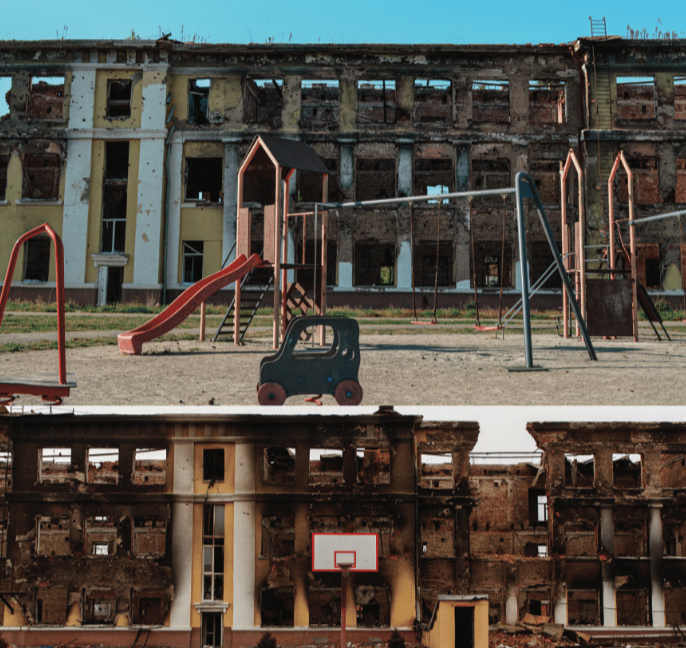
Retired school teacher Suzanne O’Connor
A 50-year career in teaching has taken Suzanne O’Connor around the world. Now, as we pass the second anniversary of Russia’s invasion of Ukraine, she’s teaching Ukrainian students, writes Sue Osborne.
English and Religious Studies teacher Suzanne O’Connor has worked in Canada, India, Timor-Leste and Africa, the central west of NSW and at St Francis Xavier’s College in Newcastle, 160 kilometres north of Sydney, where she taught with former IEUA NSW/ACT Branch Secretary Mark Northam.
O’Connor spent the 20 years before she retired at St Vincent’s College Potts Point in central Sydney.
International classroom
Retirement is not really an accurate description of O’Connor’s status, as she taught in Timor-Leste for the two years preceding the COVID-19 pandemic.
“I volunteered with the Loreto nuns in Calcutta in 2013 and I wanted to go back,” she says. “I was teaching the street children there which was an extraordinary experience. But [Prime Minister] Narendra Modi said people could no longer go to teach in India,
so I went to Timor-Leste instead.
“I was teaching ‘baby’ nuns – as Timor-Leste is very much pre-Vatican 2, the only way intelligent young women can avoid becoming mothers early in life is to train to become nuns. They are smart women and one in particular I hope becomes prime minister of Timor-Leste.
“When COVID started, the Australian Government sent two planes to fly us all back. I had two weeks in isolation, which was quite traumatic. The nuns sent me a bottle of gin though, so that cheered me up.”
Education under fire
Feeling somewhat at a loss after having to leave Timor-Leste in such dramatic circumstances, Suzanne read an article on ABC Online about teaching in Ukraine. She decided to make enquiries.
A collaborative program between Classrooms Without Walls, Smart Osvita and the Monash Virtual School at Melbourne’s Monash University was looking for volunteers to teach Ukrainian students via Zoom. The program also welcomes volunteers to teach students in Afghanistan and Myanmar.
Suzanne teaches for an hour a week on Saturdays. She doesn’t know the exact location of her students, nor their last names, for security reasons.
She says all the students are hungry for as much education as they can get.
The war in Ukraine has led to substantial damage in the education sector, putting the right to education of the country’s 5.7 million school-aged children at stake, the United Nations Educational, Scientific and Cultural Organization (UNESCO) says.
Attending school has become voluntary, O’Connor says. “A third of schools in Ukraine have been destroyed. Destroy education and you destroy culture.”
Human Rights Watch has also reported on the destruction of education and educational infrastructure in Ukraine, stating in November 2023: “Russia’s full-scale invasion of Ukraine has devastated schools and kindergartens throughout the country. Since February 2022, over 3790 educational facilities have been damaged or destroyed.”
O’Connor notes that while damaged communication systems are getting repaired almost at once, the same isn’t happening for schools.
Language lessons
“The students are keen on Western culture and developing their English,
as they want to be part of NATO and the West – it’s part of their fight against the Russians,” O’Connor says.
“In the past, if schools were found to have Ukrainian language books,
they were shut down. You could be sent to the gulag for having Ukrainian literature at home. So language is precious to them.
“When you think about it, it’s the same situation in Australia. Indigenous people were banned from speaking their own languages after colonisation.
“My students say they want their English to be sophisticated, not just good, so we’ve been practising speeches. I’m introducing them to ideas of democracy, letting them choose their own topics to speak on. We’ve done free will.
“Their English is astounding. Mind you, I might have all the nerdiest Ukrainian students – they read Shakespeare,” she says.
O’Connor says her students are accustomed to a highly prescriptive style of teaching and learning, so she’s encouraging them to express their opinions. “They are very shy of this, because they think there must be a ‘right’ answer when it comes to literature,” she says.
“I’ve been working on their critical thinking. It’s been a challenge, but very interesting. I get them to watch various speeches, like [former Prime Minister] Kevin Rudd’s Apology [to the Stolen Generations] address.”




































































































































